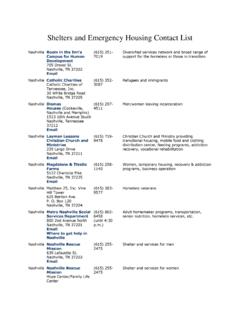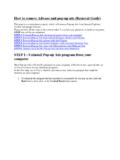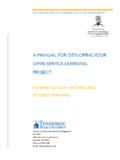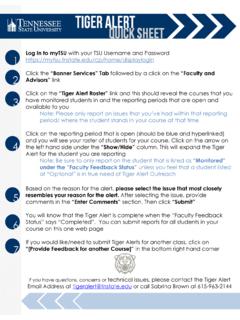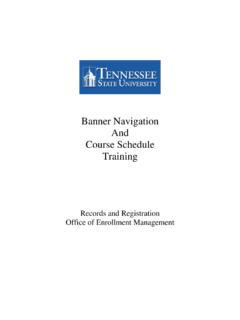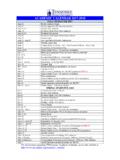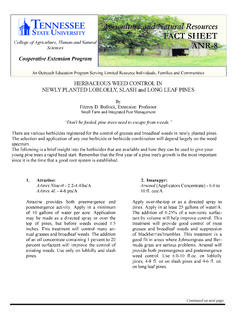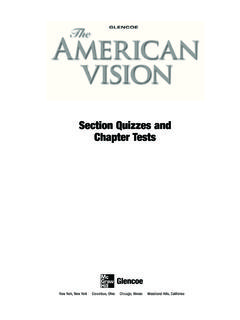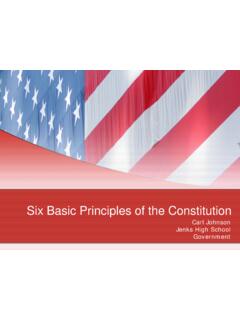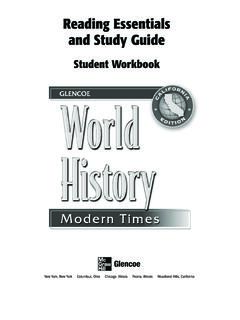Transcription of MPA Comprehensive Exam Question Examples
1 MPA Comprehensive Exam Question Examples 1 Be aware that questions evolve over time as do the respective core courses. Nonetheless, this list can give you a sense of the types of questions which have reflected the various core domains. It is essential that you study the materials from your core courses to prepare for the exams : do not solely rely on this document as a study guide. These sample questions do not cover the entire range of important learning objectives from the core courses. Some questions may fit into more than one of the core domains shown, and exam questions may integrate across multiple domains.
2 Note: Statistics (PADM 6110) is not assessed on the MPA Comprehensive exam. Therefore sample questions from only eight core course areas are shown below. For more information on the format of the exam, how it is evaluated, and the scheduled exam date for the semester, please see the Online MPA Handbook (Section IX. The MPA Comprehensive exam requirement) and the links provided in that section. If you have further questions, please check with your advisor or (in summer) the department chair. Seminar in Public Administration r.
3 201680 1. Do public sector managers have to participate in the policy making process? Why? How? Isn t it the manager's job to just implement policies made by elected officials? Why do they have to be involved in policy-making and what kinds of skills and resources do they need to develop? These questions have been actively explored throughout the development of public administration scholarship. Write an essay discussing the major perspectives on these questions either of the key theorists who have discussed the proper role of the public sector manager or from the key era(s) in public administration where that proper role has been debated.
4 Include the strengths and weaknesses of the theoretical or historical perspectives you include. 2. Explain why public organizations are said to be more difficult to evaluate than private organizations. Why is this important for early-career public administrators to know? 3. Contemporary public administration has been powerfully influenced by the broader governmental system of which it is a part: by past and present political and administrative values and by contemporary social change. In recent years, increasing attention has been paid to public ethics and reinventing government at all levels.
5 Referring to the relevant literature, do you envision this recent trend as a permanent feature in the profession or only a fleeting phenomenon? 4. Based on the United States Constitution, which internal and external stakeholders, in the policymaking process, possess constitutional legitimacy for their role in making public policy? Do entities with explicit power have more influence than those entities with implied powers in making public policy? Should they? Why or why not? MPA Comprehensive Exam Question Examples 2 5.
6 In trying to explain the constant tension built into the public manager s role writers frequently mention at least three of the following concepts: a. Administrative discretion b. Responsibility c. Professionalism d. Legal authority e. Politicization Explain to a reader outside the field how these pressures shape the complex and conflict-ridden nature of this profession. 6. Discuss the similarities and differences between the Weberian bureaucratic model, scientific management, and the principles approach to studying public organizations.
7 Describe the basis of each theory and its impact on the development of American public administration. Also explain why critics contend these theories are not in tune with the practice of American public administration. 7. A fundamental assumption of administrative reformers in the late 1800s and early 1900s was that politics could have only adverse effects on administration. How valid is that belief? Why? How, and to what extent, do current administrative structures and practices reflect that assumption?
8 And do you see another side to politics, as a constructive force in governance? 8. Several theories have been discussed throughout the semester dealing with the proper way of defining and organizing institutions in the public sector. In your opinion, which theory is most appropriate in defining and organizing public institutions? Which theory is the most ludicrous? Explain. 9. In examining the literature of public administration over its brief history, discuss the arguments that public administration is a science, a profession, and/or a craft.
9 Which authors and arguments are the most appropriate today and why? 10. Practicing ethical public administration entails many different behaviors both internally (within the organization) and externally (outside the organization). Elaborate on the ways that corruption and graft have been discussed throughout the history of public administration, and the steps that have been taken to curtail unethical behavior. Be sure to address the role the Friedrich-Finer debate has played in the evolution of responsibility versus accountability in public sector management.
10 11. Regardless of a public administrator s formal position within an organization, leadership is understood as one of the key requirements for being an effective public sector manager. Drawing upon your MPA studies, address how the concept of a good public sector leader has changed over time. Furthermore, discuss the competing and complementary demands of being an effective internal and external leader in the public sector. 12. It is essentially impossible for any governmental unit to operate alone; therefore, it is essential for public administrators to understand the nature of intergovernmental administration and the impact of federalism.

